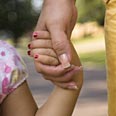
Open homes and hearts for children at risk
In time for ‘family week’ Galit Levy interviews Israeli foster families and shares their heartfelt stories of love, warmth and nurturing
Nira and Rami (both aliases) have six children altogether: Four biological children, two boys and two girls between the ages of 14-22, and two foster sons, aged nine and 10, whose parents were unable to raise them.
There are currently 350,000 children in Israel that are classified as “at risk youths”. These are typically children whose familial circumstances are detrimental to either their physical or emotional wellbeing.

Familial bonds (Photo: Index Open)
Of these at risk children, 2,200 live with foster families, like the Cohens, who give them a second chance at life and shelter them from the pain of abuse and neglect. These families usually care for these children for a limited amount of time, based upon the needs of the child in question.
Nira reports that her foster children visit their biological parents once a week and spend an entire Shabbat with them once a month. Throughout the fostering process the ties with the biological family are strengthened and maintained, with the goal of ultimately reuniting the children with their biological families.
Anat Danowitz, Director of the Foster Family Program at the Orr Shalom organization, explains that the foster family’s role is to “provide their foster children with a functional family environment as well as with all of their needs—physical as well as emotional. These families model a healthy familial environment for at-risk children, with the hopes that they’ll be able to establish their own functional family unit later on in life.”
The Cohens have long wanted to become foster parents, and maintain that while their was a “difficult period of adjustment for their biological children, who were now forced to compete with their foster siblings for anything from use of the Playstation to the parents’ attention, ultimately all the children readily found their niche within the home, and their children “absolutely worship” their foster brothers. “I cried the first time they started calling us mom and dad,” recalls Nira.
Community family group homes
Rina and Dani (aliases) run a community family group home in the Ramot neighborhood in Jerusalem. “My husband blesses all of our children, fosters or otherwise, on Friday night before the Kiddush,” says Rina, who fosters 11 children in addition to her four biological sons. “There are countless others that have already left home, but they often come by to visit and say hello.”
“My children were born into it,” states Rina, “we only stopped taking in foster children when our twins were born, and got right back into it when they were a year and-a-half old. “It is sometimes hard, for example when I gave my foster child a chocolate and a kiss for getting a good report card and had to put my own child on the back burner, but it is a way of life for us, I couldn’t imagine living any other way.”
Aided by the Orr Shalom organization, which helps with cooking, cleaning and generally managing the group home, Rina and Dani plan on finishing their five-year foster parent ‘career’ at the end of this year, and are currently looking for a family to take over management of the group home.
“It is an incredible, rewarding experience, though a true test of a couple’s relationship because there is so little time alone ,” says Rina, “but on days when the foster children are away we all miss them dearly. When they succeed and thrive it is the purest form of joy, even though it is technically not your biological child.”
If you would like inquire about becoming a foster parent or managing a Community Family Group Home, please contact the Orr Shalom organization at 03-5293733.










